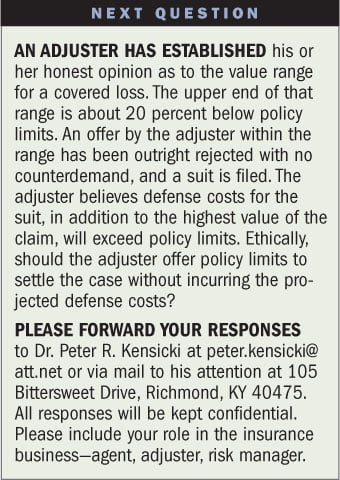In most states an insurance agent has no legal duty to recommend coverage to an applicant for insurance unless the agent, in some manner, assumes that duty (see “Special Circumstances May Mean Agents, Brokers Owe Greater Duties To Clients,” April 18, 2011 edition of NU). But the question for this column is: What ethical responsibilities does an agent have with regard to recommending coverage—and do those duties vary if the producer is a broker?”
The majority of those responding believe a producer, if he or she is a professional, has at least two duties: The first is to uncover relevant exposures of clients; and the second is to make recommendations as to the treatment of those exposures. The majority also agreed that it did not matter if the producer was an agent or a broker—the duties remained the same.
 An insurance consultant was particularly strong in his opinion. “Any insurance professional is ethically and morally, if not legally, obligated to point out loss exposures to the client. It makes no difference if there is a means to insure the exposure. If the producer knows of an exposure to loss, he or she is obligated to point it out and document such.”
An insurance consultant was particularly strong in his opinion. “Any insurance professional is ethically and morally, if not legally, obligated to point out loss exposures to the client. It makes no difference if there is a means to insure the exposure. If the producer knows of an exposure to loss, he or she is obligated to point it out and document such.”
Recommended For You
Want to continue reading?
Become a Free PropertyCasualty360 Digital Reader
Your access to unlimited PropertyCasualty360 content isn’t changing.
Once you are an ALM digital member, you’ll receive:
- Breaking insurance news and analysis, on-site and via our newsletters and custom alerts
- Weekly Insurance Speak podcast featuring exclusive interviews with industry leaders
- Educational webcasts, white papers, and ebooks from industry thought leaders
- Critical converage of the employee benefits and financial advisory markets on our other ALM sites, BenefitsPRO and ThinkAdvisor
Already have an account? Sign In Now
© 2025 ALM Global, LLC, All Rights Reserved. Request academic re-use from www.copyright.com. All other uses, submit a request to [email protected]. For more information visit Asset & Logo Licensing.








